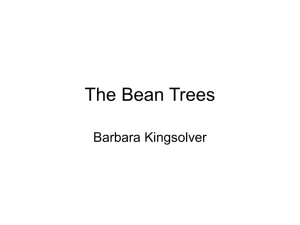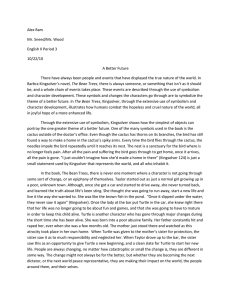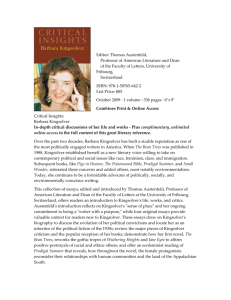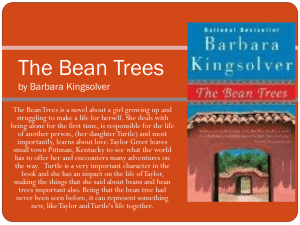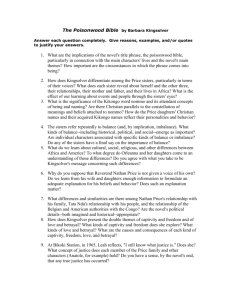The Bean Trees
advertisement
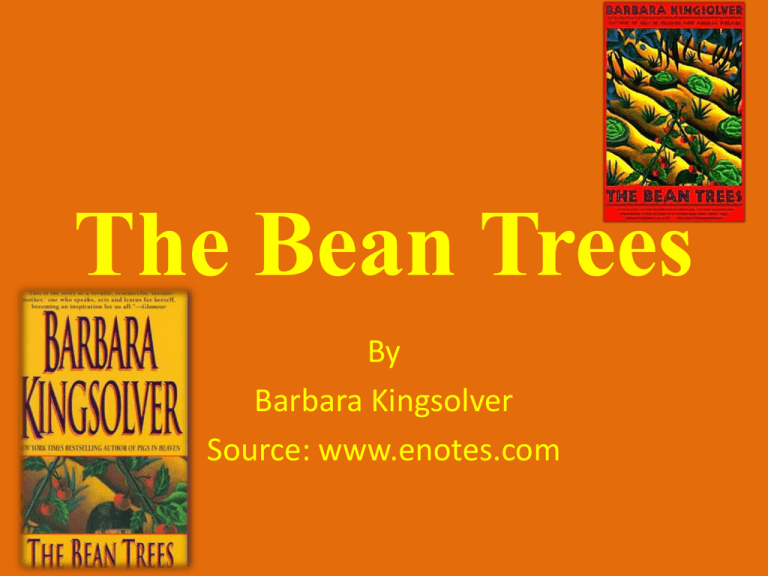
The Bean Trees By Barbara Kingsolver Source: www.enotes.com • Barbara Kingsolver demonstrates that politics are personal in The Bean Trees, her novel of friendship and survival set in the arid American Southwest. • The novel focuses on Taylor Greer's search for a new life as she moves from her dull Kentucky home to exotic Arizona and the lessons that she learns along the way. • Taylor's adoption of an abused Cherokee toddler, her friendship with a pair of Guatemalan refugees, and her support system of a small community of women, all contribute to the novel's central conviction that people cannot survive without empathy and generosity. • Published in 1988 to an enthusiastic critical reception, The Bean Trees won an American Library Association award and a School Library Association award and has found a devoted reading audience around the world. • Critics and readers alike relish Taylor's humor and warmth, with her down-home speech and perceptive observations. • Like her narrator, Kingsolver grew up in Kentucky, and she draws from the voices she heard in her youth to create Taylor's voice. • This voice helps to guide the novel, with its strong humanitarian views, away from simple political correctness toward a rich believability. • Kingsolver has been praised for her skill in The Bean Trees at walking the fine line between preaching and taking a moral stand, and Taylor's straightforwardness and humor provide the cornerstone to Kingsolver's approach. Biographical Information • Born in 1955 in Annapolis, Maryland, Kingsolver grew up in rural Kentucky. • She began writing as a young child, but chose to study biology in college at DePauw University. • In her twenties she moved to Tucson, Arizona, where she eventually earned a graduate degree in ecology at the University of Arizona. • Following graduate school, Kingsolver turned back to her life-long love—writing—and began writing nonfiction as a technical writer in a scientific program at the university. • By the mid-1980s she was writing and publishing short fiction. • Her contact in Arizona with people from Latin America, particularly refugees, influenced Kingsolver's choice of subject matter when she turned to fiction. • Published in 1988, The Bean Trees was her first novel. • Best known as a novelist, Kingsolver also writes poetry, nonfiction, and short fiction. • She believes that fiction can be used as an instrument of social change, and her own fiction reflects this belief. • Kingsolver describes her political stance as that of a "human rights activist"; to pursue these interests, she belongs to Amnesty International and the Committee for Human Rights in Latin America, two humanitarian organizations that advance the cause of human rights around the world. • In 1997 she established a literary prize, the Bellwether Prize, to be awarded every year to a first novel of exceptional literary distinction that also embodies this belief in fiction's power to change the world. • Kingsolver describes herself as a pantheist; pantheism is not an organized religion but is more a doctrine based upon the belief that the natural world is imbued with a divine presence. • Rooted in her Kentucky childhood, she credits her interest in nature as having been a major influence on her life, and her work reflects her sense that the environment cannot be ignored. • In The Bean Trees, the dry Arizona landscape that manages to produce flowers and vegetables is central to the novel. • It reflects the deprived lives of the characters who are able to flourish in spite of their difficult circumstances. • Kingsolver has won several literary awards for her work, among them an American Library Association award and a School Library Association award for The Bean Trees. • Audiences around the world have responded warmly to The Bean Trees, as it has been translated into several languages and published in more than sixty-five countries.
